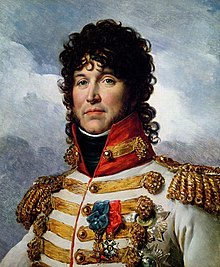| Joachim Murat | |
|---|---|
 Portrait by François Gérard, c. 1808 | |
| King of Naples | |
| Reign | 1 August 1808 – 20 May 1815 |
| Predecessor | Joseph |
| Successor | Ferdinand IV |
| Grand Duke of Berg | |
| Reign | 15 March 1806 – 1 August 1808 |
| Successor | Napoléon Louis |
| Born | Joachim Murat-Jordy 25 March 1767 Labastide-Fortunière, Quercy, Kingdom of France |
| Died | 13 October 1815 (aged 48) Pizzo Calabro, Calabria, Kingdom of Naples |
| Burial | |
| Spouse | |
| Issue | 4, including Achille and Lucien |
| House | Murat |
| Father | Pierre Murat-Jordy |
| Mother | Jeanne Loubières |
| Religion | Catholic |
| Signature |  |
| Military career | |
| Allegiance | |
| Service | French Army |
| Years of service | 1787–1813 |
| Rank | Marshal of the Empire |
| Battles / wars | |
Joachim Murat (/mjʊəˈrɑː/ mure-AH, also /mʊˈrɑːt/ muurr-AHT, French: [ʒɔaʃɛ̃ myʁa]; Italian: Gioacchino Murat; 25 March 1767 – 13 October 1815) was a French Army officer and statesman who served during the French Revolutionary and Napoleonic Wars. Under the French Empire he received the military titles of Marshal of the Empire and Admiral of France. He was the first Prince Murat,[1] Grand Duke of Berg from 1806 to 1808,[2] and King of Naples as Joachim-Napoleon[3] (Italian: Gioacchino Napoleone) from 1808 to 1815.[4][5]
Born in Labastide-Fortunière in south-western France, Murat briefly pursued a vocation in the clergy before enlisting in a cavalry regiment on the outbreak of the French Revolution. Murat distinguished himself under the command of General Napoleon Bonaparte on 13 Vendémiaire (1795), when he seized a group of large cannons and was instrumental in suppressing the royalist insurrection in Paris. He became Napoleon's aide-de-camp and commanded the cavalry during the French campaigns in Italy and Egypt. Murat played a pivotal role in the Coup of 18 Brumaire (1799), which brought Napoleon to political power. In 1800 he married Caroline Bonaparte, thus becoming a brother-in-law to Napoleon.
Murat was named a Marshal of the Empire on the proclamation of the French Empire. He took part in various battles including those of Ulm, Austerlitz, Jena and Eylau, where he led a famous massed cavalry charge against the Russians. In 1806, Murat was appointed Grand Duke of Berg, a title he held until 1808 when he was named King of Naples. He continued to serve Napoleon during his Russian and German campaigns but abandoned the Grande Armée after the Battle of Leipzig to save his throne. In 1815, Murat launched the Neapolitan War against the Austrian Empire but was decisively defeated at Tolentino. He fled to Corsica and then made a last-ditch attempt to recover his throne, but was soon taken prisoner by King Ferdinand IV of Naples. He was tried for treason and sentenced to death by firing squad in Pizzo.
- ^ Atteridge 1911, Chapter VII.
- ^ Atteridge 1911, Chapter IX.
- ^ Zamoyski 2018.
- ^ Emsley 2014, pp. 59.
- ^ Atteridge 1911, Chapter XIII.
